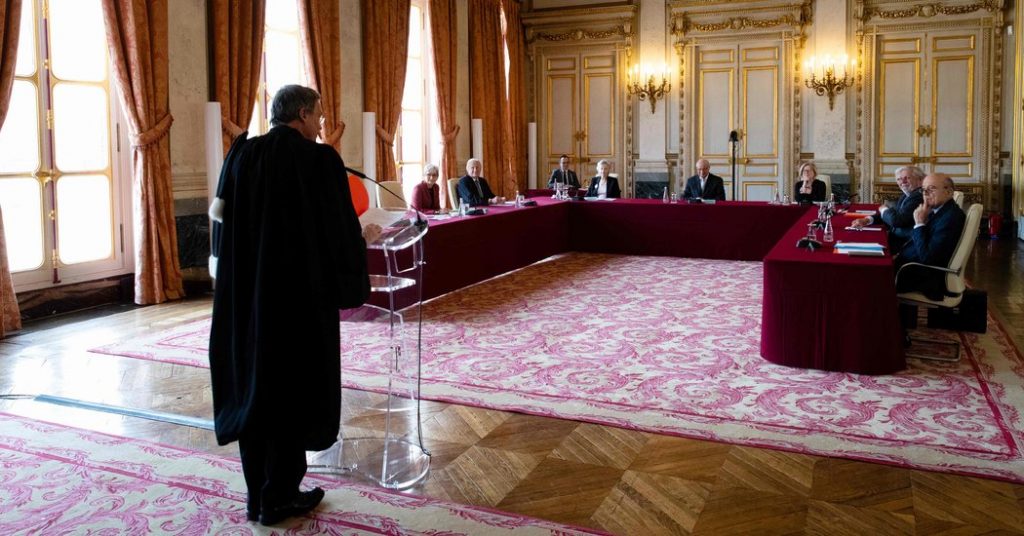PARIS — A top French court on Thursday struck down critical provisions of a law passed by France’s parliament last month to combat online hate speech, dealing a severe blow to the government’s effort to police internet content.
The court’s ruling comes as authorities around the world try to regulate what can be shared on vast internet platforms like Facebook, YouTube or Twitter, all American companies with attitudes toward free speech and government oversight that often differ from Europe’s.
The flagship provision in France’s new law, which was supported by President Emmanuel Macron’s government and sponsored by his party, created an obligation for online platforms to take down hateful content flagged by users within 24 hours. If the platforms failed to do so, they risked fines of up to 1.25 million euros, or about $1.4 million.
But the Constitutional Council, a French court that reviews legislation to ensure it complies with the French constitution, noted in its ruling on Thursday that the measure put the onus for analyzing content solely on tech platforms without the involvement of a judge, within a very short time frame, and with the threat of hefty penalties.
The court said this created an incentive for risk-averse platforms to indiscriminately remove flagged content, whether or not it was clearly hate speech.
The law’s provisions “therefore infringe upon the exercise of freedom of expression and communication in a way that is not necessary, suitable, and proportionate,” the court said in a statement.
The court also struck down a part of the law that obligated tech platforms to remove — within one hour — content flagged by the authorities as child pornography or terrorist propaganda, arguing that the extremely short time frame and lack of independent review of the content also violated freedom of expression.
Only minor measures in the law, like the creation of an official online hate speech watchdog, still stand.
Opponents of the law praised the ruling. The hate speech bill had angered politicians on both the left and right as well as tech platform lobbyists and digital liberty advocacy groups. Even some of the government’s own advisory bodies for digital matters had expressed misgivings.
“Too often one makes bad laws with good intentions!” Philippe Bas, a right-wing Republican lawmaker in France’s Senate, said on Twitter.
One lobbying group that includes Google and Facebook in France said in a statement that it was “letting out a big sigh of relief after the ruling,” while La Quadrature du Net, a digital rights advocacy group — and fierce critic of those very tech giants — cried “Victory!” against a law that “organized an abusive censorship of the internet.”
Laetitia Avia, the lawmaker from Mr. Macron’s party who sponsored the bill in France’s lower house of Parliament, said in a statement on Thursday that she did not intend to “give up the fight,” and that the court’s ruling was a “road map to improve a plan that we knew was unprecedented and therefore perfectible.”
Strong anti-hate speech laws already exist in France, often with criminal penalties, but Ms. Avia and other supporters of the new law had argued that those rules, instituted before the emergence of social media platforms, held little sway online.
“Our message must be clear: what isn’t tolerated in public spaces mustn’t either on the internet, no more than we can let racist, anti-Semitic, LGBT-phobic, sexist comments proliferate online with impunity,” Ms. Avia said in her statement.
The French justice ministry said in a statement later on Thursday that the government was “studying the possibility of reworking” the hate speech measures by taking into account the court’s ruling.
France’s law was based in part on a similar one in Germany, where Facebook and other companies could face fines of up to 50 million euros if they systematically fail to remove “obviously illegal” content within 24 hours.
Other countries are also grappling with how to regulate online content. In Britain, policymakers are drafting a new online harms bill that would restrict certain violent and extremist content from being shared. European Union officials are also weighing new rules that could hold companies liable for material posted on their sites.
In the United States, the Justice Department this week released recommendations to repeal parts of a law that gives internet platforms broad immunity from lawsuits for words, images and videos that people post online.
Adam Satariano contributed reporting from London.

